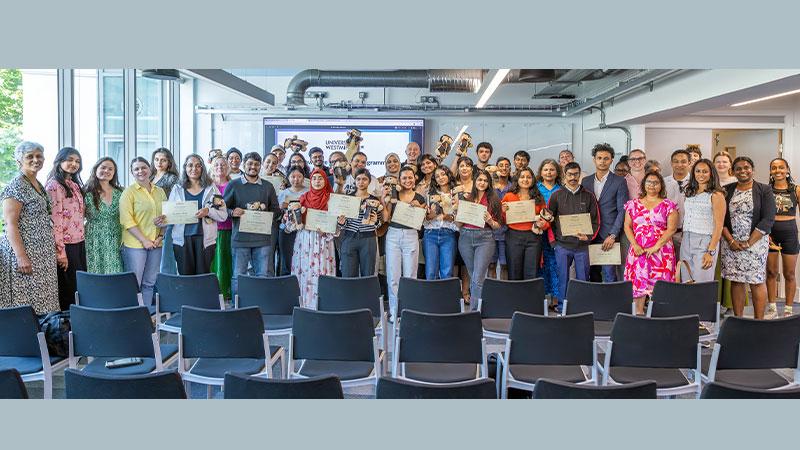The University of Westminster celebrated the successful completion of the final year of its two-year student-led Knowledge Exchange (KE) project with a special graduation event. Funded by the Quintin Hogg Trust and running from August 2023 to July 2025, the programme empowered students and local community members through collaborative, reciprocal learning.

Held in June 2025, the event brought together students, charity participants, academic colleagues and representatives from partner organisations to recognise the project’s achievements and enduring impact. Certificates were awarded to acknowledge each individual’s contribution, and heartfelt testimonials highlighted the personal growth, collective learning and collaborative spirit that characterised the initiative.
The programme aimed to build stronger communities through Principles for Responsible Management (PRME), Public and Community Engagement (PCE) and Student co-creation. It was developed in partnership with schools across the University, including the School of Organisations, Economy and Society’s Sobia Razzaq, Senior Lecturer in Law; and the School of Accounting and Finance’s Dr Kumari Juddoo, Senior Lecturer in Finance and Accounting; Dr Sudha Mathew, Senior Lecturer in Finance and Accounting; Dr Sheeja Sivaprasad, Principal Lecturer in Finance; and Sheena Patel, KE Project Coordinator at the University.
The initiative offered students the opportunity to engage in shared workshops on Excel, personal finance and Generative AI alongside charity participants. In its second year, the project significantly expanded its reach by supporting over 100 students and partnering with a range of external charities, including the Paddington Development Trust, the Marylebone Project and Westminster City Council.
The programme was grounded in a process of mutual knowledge exchange, where students and participants explored practical tools together, drawing on one another’s strengths, questions and real-life experiences. This approach enabled students to deepen their understanding of diverse lived experiences and helped participants feel seen, respected and supported. In turn, it developed a strong sense of belonging and trust, essential for meaningful personal development and community connection. Through this reciprocal learning model, both groups developed not only practical skills but also empathy, confidence and a shared sense of purpose.
Reflecting on the experience, Vanikha Batchu, an Investment Risk Finance MSc student, said: “The KE session was an eye-opening experience. Teaching AI to those who had never used it before showed me just how powerful and accessible these tools can be.”
A highlight of the final year was the international knowledge exchange with Westminster International University in Tashkent (WIUT). Fourteen people from Westminster Business School (WBS) travelled to Uzbekistan for a transnational knowledge exchange programme. Both sets of students co-delivered Excel and Generative AI workshops to local participants, engaging in a shared cross-cultural collaboration that cultivated global perspectives, mutual understanding and practical learning rooted in real-world application. Through this initiative, students, colleagues and community members have co-created knowledge opportunities, working together to build more resilient and equitable communities.

About the programme Sobia Razzaq said: “As the project concludes in July 2025, the project team expresses a heartfelt thanks to all students, charity partners and academic leaders who brought this vision to life. The Knowledge Exchange Programme leaves a strong legacy of collaboration, community impact and transformative education, paving the way for future initiatives that place partnership and purpose at their core.”
The Knowledge Exchange Programme reflects the University’s commitment to inclusive, practical education and global citizenship. It has directly contributed to the United Nations Sustainable Development Goals (SDGs), particularly 4: Quality Education, 8: Decent Work and Economic Growth and 17: Partnerships for the Goals. Since 2019, the University of Westminster has used the SDGs holistically to frame strategic decisions to help students and colleagues fulfil their potential and contribute to a more sustainable, equitable and healthier society.
Find out more about the Westminster Business School.






